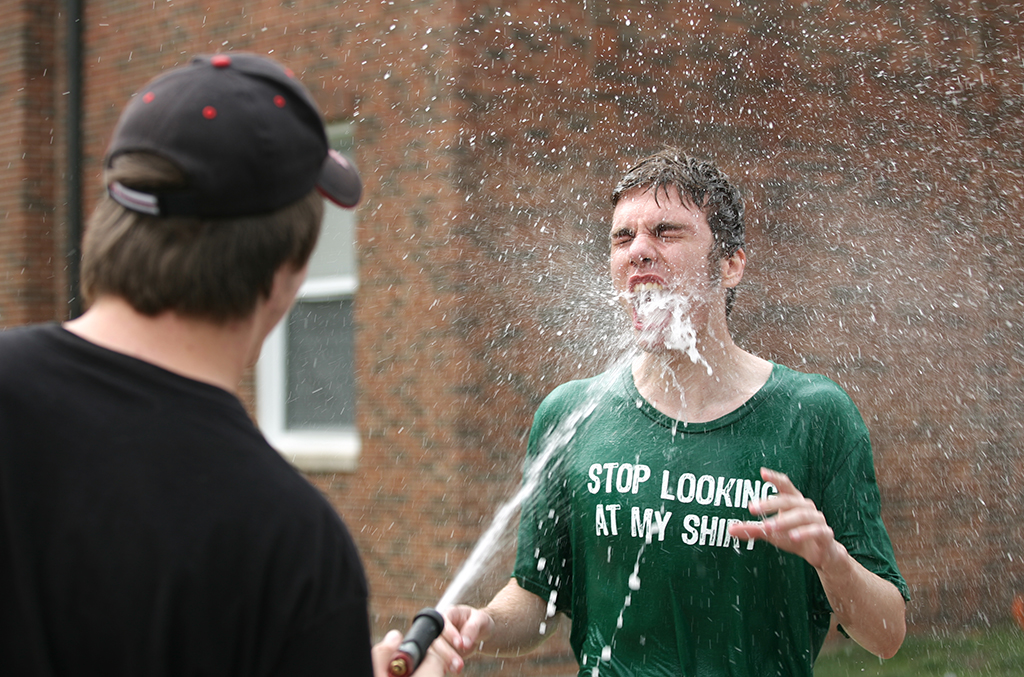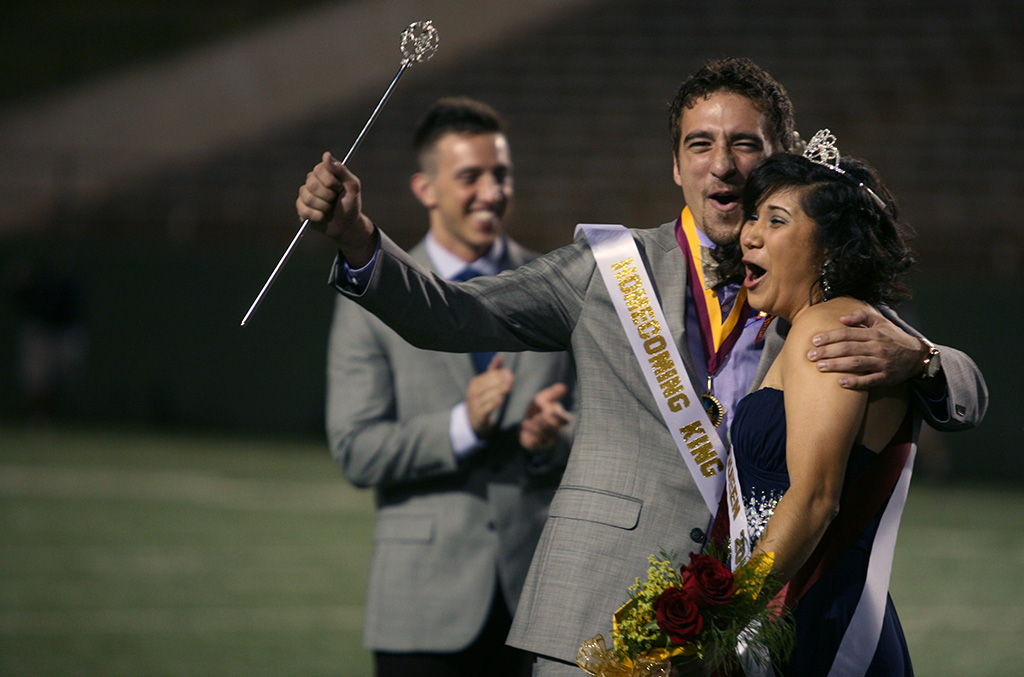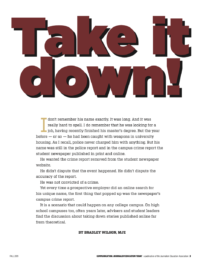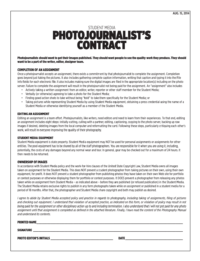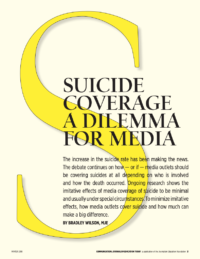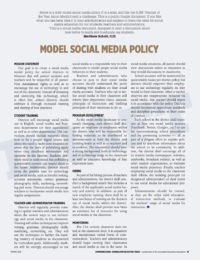Policies
The first thing to realize about writing policy is that any policy worth writing has probably already been written. For example, here are some journalistic codes of ethics that can adapted for or adopted by any scholastic or collegiate media.
- National Press Photographers Code of Ethics and Statement of Principle regarding digital manipulation
- Society of Professional Journalists Code of Ethics
- National Public Radio Code of Ethics
- Radio Television Digital News Association Code of Ethics
- Society of American Business Editors and Writers Code of Ethics
- Association of Food Journalists Code of Ethics
- Standards and Ethics of The New York Times
The list could go on.
One of my favorite classes while working on my master’s degree in public administration at Syracuse University and my doctorate at North Carolina State was policy analysis. We looked at various policies and their impact (and unintended consequences) on stakeholders. We examined budgetary implications. And we looked at how political leaders and bureaucrats implemented the policies all in an attempt to learn how to write better policy.
Here are some policies I’ve helped to write over the years that can serve as guidelines for other media outlets.
Sample policies
GENERAL OVERVIEW
The student media include student-produced publications, a products of a co-curricular publication class and extracurricular involvement. In general, the student media will provide memories, a record of historical events, data regarding the year, educational opporÂtunities for staff members, and comÂmunication opportunities as well as a chance to plan, to write, to take pictures, and to design a book for the students.
The yearbook attempts to inform and to entertain its audience in a broad, fair and accurate manner on all subÂjects that affect readers. The entire student body constitutes the primary audience for the book with secondary audiences including: faculty, staff, administrators, parents and other members of the community. Members of the journalism community constitute a tertiary audience. The content of the book will focus on covering the school year, meeting the needs of the majority of the students.
Staff members allow and encourage conÂstructive criticism of any part of the media, before or after publication. However, final authority for content of the book rests in the hands of the student staff. Any controversial decisions will be made by the editor, the staff and the adviser. Despite the court ruling in Hazelwood vs. Kuhlmeier, administrators rely on the adviser and staff to make content decisions.
No material will be printed which the editor deems in poor taste.
EMPLOYEES
As the voice of the students, students who work for the student media will find that no other group on campus can make such a positive difference in the campus community as the student media. Staff members hold a great deal of power and therefore have a huge responsibility to be accurate, fair, thorough and timely. The standards are high.
Staff members are VOLUNTEERS until they have been officially hired and the appropriate paperwork is completed and approved by the student editor and adviser and is completed in accordance with university policy and state law. Until students are officially hired, they are owed no compensation for any works produced and are considered volunteers. It is the responsibility of the student employee to complete the hiring process, once initiated, within 72 hours or the employment agreement will be considered invalid.
EDITORIAL LEADERSHIP
The editorial staff is the decision-making body of all student media. Members include the editor and section editors. The editorial staff meets weekly, along with other contributors to the student media. The adviser or editor may also call unscheduled meetings. Attendance is mandatory for all editorial board members. Other contributors should attend regularly. Habitual unexcused absences are grounds for dismissal. Editorial staff members are subject to review if they fail to fulfill their duties. The board may dismiss a member with a majority vote, but the editor and adviser may also choose to dismiss an editor without the approval of the editorial board with cause. The board is responsible for recommending a replacement for a vacated position, and the adviser must approve the replacement. All editorial staff will vote on issues such as policy-making decisions. A majority vote determines the decision. The adviser may make suggestions. Concerning the publication of controversial issues, the editorial staff will discuss and vote on the approach to be taken. A majority vote will be the deciding factor, including the stance of the staff editorial.
STUDENT PARTICIPATION
Entry-level student participants must have and must maintain a 2.0 overall grade point average and must be full-time students as indicated in the student’s official records. To advance to a leadership role such as section editor, editor, producer and the like, students must have a 2.5 cumulative grade point average and must be full-time students.
THE ASSIGNMENT
Once a staff member, paid or volunteer, accepts an assignment, there exists a commitment by that person to complete the assignment. Completion goes beyond just taking the pictures, shooting the video or writing the story.
For photographers, it also includes gathering complete caption information, writing that caption and typing it into the File Info fields for each electronic file. It also includes making sure the digital images are filed in the appropriate location(s) including on the photo server.
For reporters, it also includes uploading the story to the website and engaging in the appropriate social media to promote the story and content. An “assignment†also includes:
- Actively taking a written assignment from an editor, writer, reporter or other staff member for the student media;
- Verbally (or otherwise) agreeing to take a photo or write a story or otherwise produce work for the student media;
- Finding good stories or action shots to take without being “told†to take them specifically for the student media; or
- Writing stories, shooting video or taking pictures while representing the student media by using student media equipment, obtaining a press credential using the name of the student media or otherwise identifying yourself as a member of the student media staff.
EDITORIALS
An editorial will appear in each issue of the student media. Stands taken in the main editorial will represent the opinion of the staff and will not be bylined. Editorial shall be based on fair and accurate reporting and should not be published on topics about which an objective news story has not been published or is not being published in the same edition or at the same time. All other opinionated pieces, including those differing with the editorial, will be handled through cross-point columns, editors’ column, feature columns, letters-to-the-editor, exchange columns, student opinion photo forums and entertainment reviews. Such items will be clearly labeled and designed as opinion pieces and will be the opinion of the author.
OBITUARIES
Should a student, staff or faculty member die anytime during the current coverage period, student media staff will treat the death in a tasteful, respectful manner. A short obituary with the individual’s name, school activities, date of birth, date and manner of death (if appropriate) and any other pertinent information shall appear in the news section. No mug shot will be used. This uncommanding treatment will provide adequate memory of the individual for those closely associated, while not overemphasizing it for other readers.
OWNERSHIP OF WORKS PRODUCED
In accordance with student media policy, the student media shares ownership with all images and other works produced on assignment for the student media.
This does NOT prevent a student photographer (or other employee/volunteer) from taking pictures on their own, using their own equipment, for profit. This does NOT prevent a student reporter from working for other media outlets on campus or off. It does NOT prevent a student photographer from publishing photos they have taken on their own Web site for portfolio purposes or otherwise displaying them for portfolio purposes or from entering images in contests.
It DOES prevent a photographer from releasing any photos or video taken while on assignment from the student media – as indicated above – before they are published online and/or in print. It DOES prevent a reporter from releasing works produced to other media outlets before the work is published in the student media.
The student media retain the rights to publish in any form photographs, videos articles or other work taken while on assignment or published in the student media.
SOCIAL MEDIA
When posting to social media sites (Twitter, Facebook, Instagram, etc.), the student media staff should pay attention and abide by laws regulating improper conduct like discrimination, violation of copyright laws, harassment, defamation and disclosure of confidential records. Only approved editorial staff may make posts to said social media platforms.
Pay attention to the clarity, length, accuracy and tone of comments before posting them. Posts should be professional and in good taste.
Sign post with your real name and indicate relationship to the student media. Anonymous signatures are not permitted.
Respect the view of others, whether or not you agree/disagree.
Obey the Terms of Service of any social media site or platform in which you participate.
Refrain from being confrontational or using inappropriate argument on social media sites.
Avoid spending excessive time using social media for personal reasons while working.
Ensure that the language used on social media sites is easily understood.
CORRECTIONS
As repeated studies of media consumers have shown, factual errors corrode the credibility of media publishing the mistakes. All student media are obligated to correct any error they make as soon as possible, no matter the level of consequence for the error. The corrections should be in a fixed, consistent location in the publication. The following procedure will be used when determining the need for a correction or clarification and how it should be implemented.
Responsibility
The editor will be finally solely responsible for the publication of the student media, but all members of the staff and editorial board shall take responsibility for the following actions in conjunction with the editor.
The editor shall respond to all electronic communication, telephone communications or in-person communications regarding corrections/clarifications. All communication of such a nature will be by the editor or manager.
All staff members shall notify the adviser immediately of any corrections/clarifications that may involve legal action.
The editor in coordination with any included section editors and staff members shall determine the validity of each request for a correction or clarification by personally contacting any individuals suggesting such a need.
The editor or managing editor shall contact the staff members involved, and document that contact, on the same day the potential error is brought to his or her attention.
After the editor or manager has determined a need for a correction or clarification, he or she shall adhere to the following guidelines:
- Print media will publish in the next edition all corrections and clarifications given to the publication on page 2 in a consistent location on that page.
- All media will make any necessary corrections/clarifications to online material as soon as practical and shall add a note to any content that has been changed online.
- Media will maintain a link to all corrections/clarifications that shall be updated as each correction/clarification has been made.
Form
Although the specifics may vary depending on the circumstances, in general, a correction will take the form: “In ‘’ (p. <#>, ), the . regrets the error.†When a source believes he or she has been misquoted or otherwise attributed to mis-statements, but the editor/managing editor, after consultation with the reporter, believes the published statements were correct, a clarification may take the general form: “In ‘’ (p. <#>, ), In subsequent interviews with , they state . The stands behind the original publication.†When a correction or clarification is made online to a story that appeared in print, the publication will note that in an editor’s note to appear at the top of the online version of the article. “Information in this article, originally published has been corrected. â€
TAKE-DOWN
Student media do not remove content from their websites or social media without a compelling legal justification. The staff members believe unnecessarily altering the contests of the web presence and/or social media presence would be a disservice to our readers because it would prevent the website from accurately documenting history as it happens.
If an article is factually inaccurate, the inaccuracies should be reported to the editor for corrections and/or clarifications.
More information on take-down requests.
Take down requests, a handout.
LETTERS TO THE EDITOR
The newspaper staff encourages letters as they constitute a constructive avenue for student opinion, but the writer must sign the letter to be considered for publication. However, the newspaper staff has the right to withhold the name of the addresser or the entire material if it characterized by unlawful action, libel, and tastelessness or if it is deemed irresponsible. Due to space limitations, not all letters can be published, and the editorial staff reserves the right to edit all letters for appropriate placement in the paper as long as the meaning and intention of the letter remains clear and unchanged. Although the newspaper staff writes the majority of the articles appearing in the student media, guest commentaries and stories may be included if the staff feels it enhances coverage of a unique topic. Gossip columns, song dedications and student best/worsts will be avoided due to the narrow audience they serve and the probability of libelous material. No material, opinionated or otherwise, will be printed which is libelous, irresponsible, advocates an illegal activity or which the editor, editorial staff and/or the adviser deem in poor taste.
ADVERTISING
Preference should not be given to certain advertisers because of their relation with the advertising manager. Advertisers must sign a contract agreeing to pay for the advertising spot purchased before the ad may be placed. The student media leaders reserve the right to reject advertising. The student media are not liable for typographical errors as well as others in an ad submitted by the advertiser. Advertisements will be placed on the newspaper as long as they are not libelous, distasteful or imprudent. Advertisements should be submitted to the advertising editor four days before publication.
SALES AND REFUNDS
As with all publications produced by the student media, satisfaction is guaranteed or the purchase price will be refunded.
Any student who does not wish to keep a yearbook or magazine may obtain a refund provided that the book is returned in the same condition in which it was distributed. Returned books must be free of damage and writing. Once reÂturned, the book becomes the property of the publications department and can be re-sold at the current cost.
Exchanges can be made for books with minor flaws if no writing has been done in the book. Books with major flaws as determined by the adÂviser may be returned.
The responsibility for providing proof of purchase rests with the buyer of the book if no record can be provided by the staff. A valid receipt or canÂcelled check deposited in the yearbook activity account will constitute proof of purchase. Receipts for all purchases will be provided by the staff.
ETHICAL RESPONSIBILITIES
Journalism best serves learners and the school community when students produce free and responsible news media by balancing rights and responsibilities, applying ethical prudence and advancing the best interests of young citizens and the school mission.
Source: National Scholastic Press Association Code of Ethics
Race, sex, age and religion should only be reported when such information is appropriate. Stereotyping should be avoided and stories that appear to degrade a particular group; race, gender or sexual orientation will be prohibited. In addition, racist, sexist and other condescending comments should be avoided in the newsroom.
As a general rule, no member of the staff will use anonymous sources. Use anonymous sources only if there is a compelling reason and only if the information given can be verified through another, known source. Consider sources’ motives before promising anonymity. All members of the editorial board (but not the adviser) shall, in advance, approve the use of any anonymous sources and shall approve such use only when no other source is available to provide the information in a timely fashion. When sources are not given, people will question the credibility not only of the source but also of the student media.
Staff members will be cautious about identifying students accused of criminal acts or disciplinary infractions, disclosing only names obtained through official records or otherwise publicly available or accessible as common knowledge. The names of some crime victims, especially victims of sex crimes, should be protected from disclosure..
